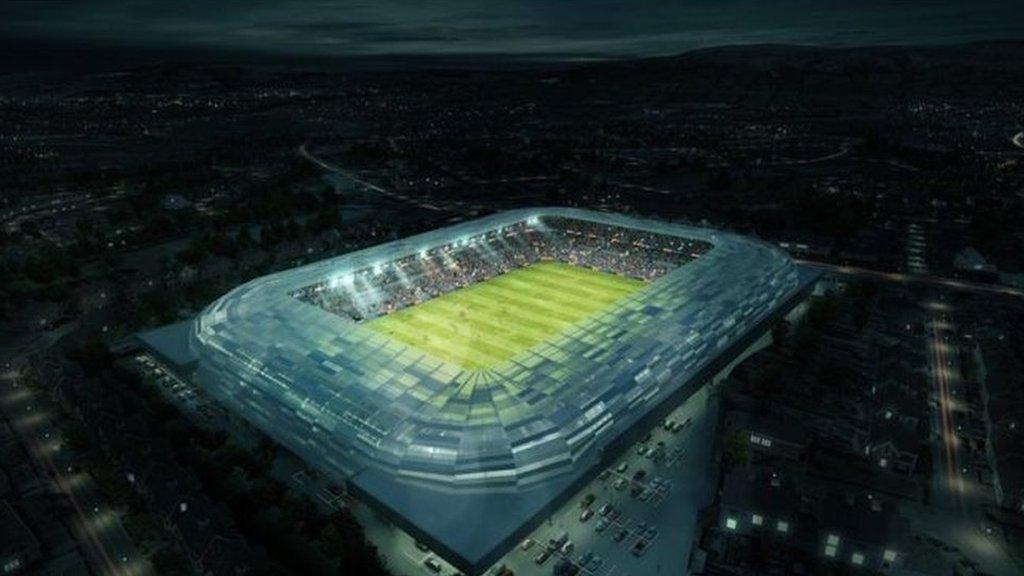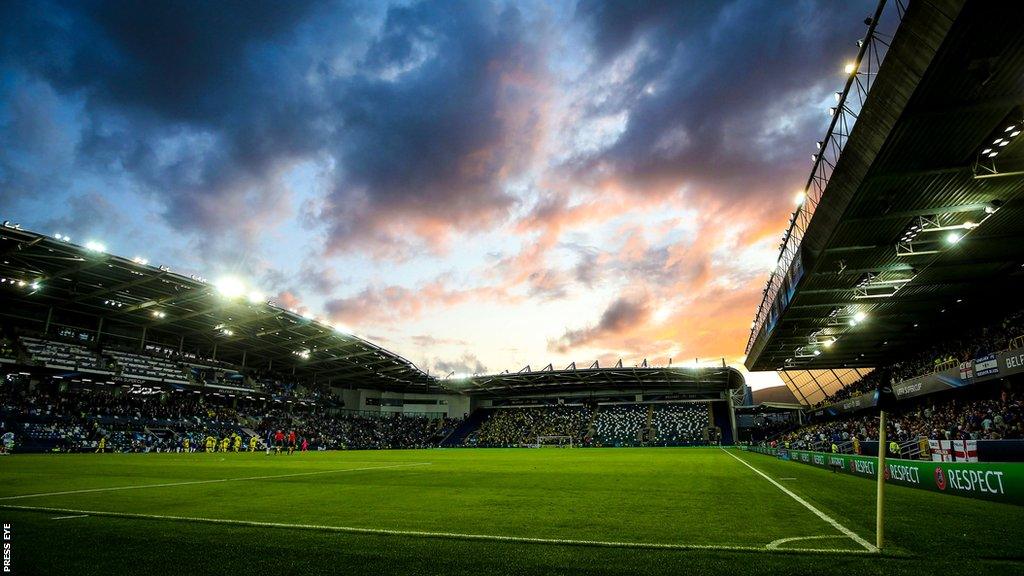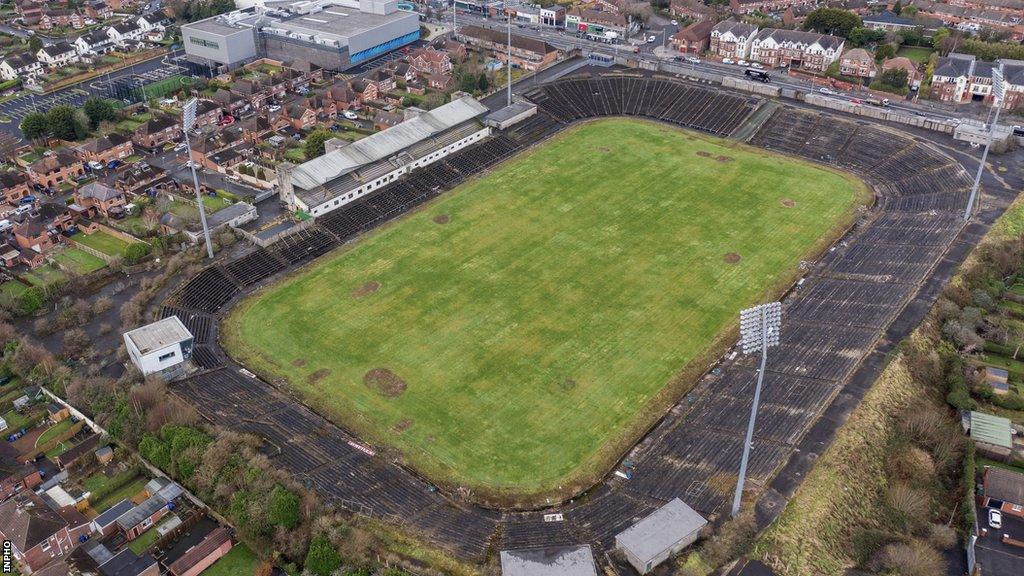Euro 2028 bid: Belfast's potential host venue Casement Park the subject of much controversy
- Published

An artist's impression of the proposed Casement Park stadium which would have a capacity of 34,500
Belfast's Casement Park may appear an unlikely choice as one of the 10 venues which form part of the UK and Republic of Ireland's joint bid to host the Euro 2028 finals.
First of all, like Everton's new stadium, it doesn't actually exist yet. However, unlike at Casement Park, construction of the new ground at Bramley-Moore Dock is actually under way at the moment.
Secondly, the primary use historically has been by the Gaelic Athletic Association (GAA), and it was the home of Antrim's Gaelic football, hurling and camogie teams. It hasn't been used since 2013 and has since fallen into disrepair.
The proposed redevelopment of the site, which is set to become a state of the art 34,500 capacity stadium after initial plans for a 38,000 seater were rejected, has been hindered by a number of setbacks since first being suggested about a decade ago, including long-running legal challenges. Work on building it has yet to begin.
With the UK and Ireland now the sole remaining bid for the Euro 2028 finals, BBC Sport examines some of the challenges that have surrounded the rebuilding of Casement Park.
Why have existing NI stadiums not been selected to host Euro matches?
The National Football Stadium at Windsor Park in south Belfast, home of the Northern Ireland football team and Linfield FC, the most successful team in the history of Irish League football, is located just two miles from Casement Park.
However, its all-seater capacity of 18,500 is well below the minimum 30,000 requirement for the tournament finals.
Ulster Rugby's Kingspan Stadium houses a similar number of spectators, including areas for standing on all four sides of the arena.
What are the origins of plans to redevelop Casement Park?
Casement Park was the home of Antrim GAA but has not been in use since 2013.
Initial plans for a new 38,000-seat stadium were opposed by nearby residents, who asked the High Court to overturn the granting of planning permission, claiming the proposed development was simply too big for the area, would block out light, and make traffic congestion worse.
In December 2014 a High Court judge quashed a ministerial decision to grant approval.
New plans presented by the GAA in 2016 to build a stadium with a reduced height and scale and reduced capacity of 34,500 were also opposed by residents.
The GAA said it was aiming to work within the original budget of £77m, with the aim of being open by 2019 in time for the following year's Ulster Senior Football Championship.
The GAA said the plan showed its willingness to "engage and listen".

Northern Ireland play their home matches at Windsor Park but the stadium's 18,500 capacity is too small for the Euro 2028 finals
Selected as a Euro bid venue
It was announced on 12 April this year that Casement had been selected as one of the 10 venues on the final shortlist for the Euro 2028 bid, a list which also included Dublin's Aviva Stadium.
The response to the news was mixed - but it was welcomed by the GAA, the Irish Football Association, the governing body of soccer in Northern Ireland, and men's international team manager Michael O'Neill.
O'Neill commented: "Securing this bid for Northern Ireland would be transformative for our legions of passionate football fans.
"I am fully behind it and hope everyone will lend their support to it too."
However, a Northern Ireland football supporters' group, the Amalgamation of Official Northern Ireland Supporters' Clubs (AONISC), said it was not in favour of tournament matches being played at a rebuilt Casement Park.
A spokesperson said: "It is our view, and indeed our preference, that football tournaments should be hosted by football stadia."
Obstacles still in the way
By the spring of 2023, a number of major hurdles remained to be crossed before any international football matches could be played at Casement Park.
The stadium construction was put on hold because of the absence of ministers at Stormont, where devolution had been suspended since February 2022, and there was no agreement on funding for the project.
However, the GAA said it was confident the new Casement Park stadium would be built and revealed that progress had been made behind the scenes.
The UK government was sending out similarly positive noises, saying it was "very confident that the stadium will be delivered on time".
"The UK government will continue to work with partners including the NI Executive and GAA on the bid, including the funding for Casement Park," said a spokesperson.
Meanwhile a spokesperson for the AOINSC warned that they were keeping a watching brief.
"Should Casement Park receive the significant public funding required to allow redevelopment to progress, we believe that Northern Ireland football should receive parity of funding," they cautioned.
A month later, in an interview with BBC News NI, Northern Ireland Secretary of State Chris Heaton-Harris indicated the government is prepared to consider making a financial contribution to the project, if the Euros bid is successful.
"We'll get the money, don't you worry," he said.

An aerial view of the previous Casement Park GAA stadium
Who should foot the additional costs?
Protracted legal arguments and the onset of the Covid-19 pandemic in early 2020 led to further delays to the proposed stadium rebuild and by the time plans were given formal approval in the middle of 2021, the cost of the scheme had rocketed.
Initially, the estimated £77m necessary for the project to be funded was made up of £15m from the GAA and £62m from the Stormont executive.
Nicola Mallon, Infrastructure Minister in the Northern Ireland Executive at the time, stated her belief that the government, based at Stormont, rather than the GAA, should bear the extra cost.
The then First Minister of NI, Paul Givan, suggested the final bill could be more than £140m, almost twice the original projected cost.
Controversy around the Casement reconstruction and tensions in the power-sharing executive were heightened when Deirdre Hargey, at that time Communities Minister, pledged in February 2022 that work on the redevelopment of Casement would continue while announcing that a£36m funding package to upgrade and redevelop regional soccer stadia in Northern Ireland could not progress without executive sign-off.
This long-awaited funding package has been a major bone of contention with football supporters in Northern Ireland and AOINSC.
Full steam ahead?
It was revealed at the end of May 2022 that a west Belfast residents' group had lost its legal challenge to the stadium redevelopment at Casement Park.
The Mooreland and Owenvarragh Residents' Association tried to overturn the planning permission granted in 2021.
A High Court judge found against the residents whose lawyers argued that Ms Mallon acted in breach of the ministerial code, depriving them of the protection of having the plans subject to further scrutiny.
With the prospects of the Casement rebuild seemingly on an upward trajectory, another potential setback in the long-running saga emerged in August when it was reported that the board of the Stowe-based The Buckingham Group, one of the lead contractors on the project, had filed a notice of intention to appoint administrators, but was not in administration.
Ulster GAA said it was monitoring the situation closely, adding it was "assessing what affect (if any) this may have on the future delivery of our project".
The governing body of Gaelic games in Ulster added "we remain fully focused on work commencing on site early next year".
The Buckingham Group said it was unable to continue trading at this time, citing rapidly escalating contract losses and a sharp reduction in liquidity.
With the UK and Ireland now set to win the bid for Euros, questions still remain over whether Casement Park will be ready for the finals come 2028.